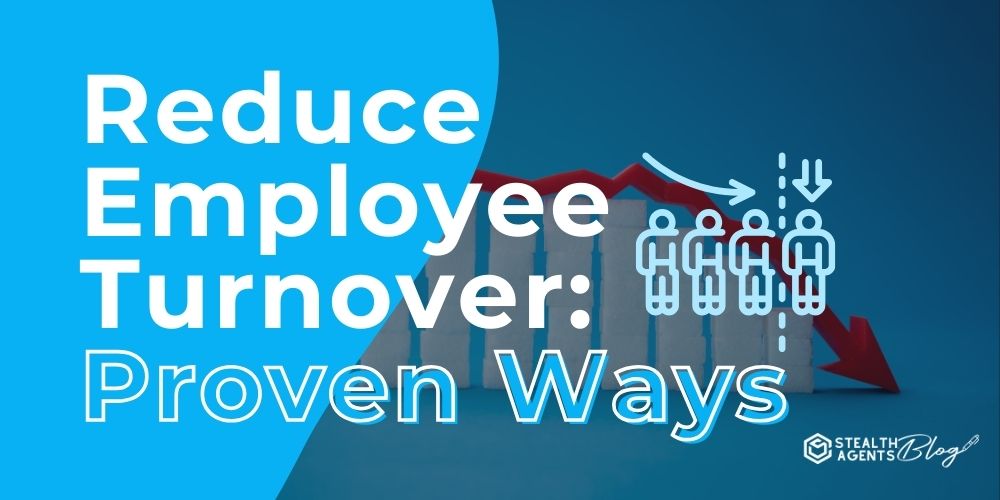Reduce employee turnover by streamlining your operations and boosting team morale with experienced virtual assistants from Stealth Agents. Our top-tier support helps you retain talent by lightening workloads, improving onboarding, and creating a more focused, productive work environment—so your best people stay longer.
Employee turnover costs U.S. businesses $1 trillion annually, impacting workplace morale and productivity.
Maintaining a stable workforce is crucial, yet many companies struggle to retain talent, leading to increased recruitment costs and lost expertise. Proven strategies to reduce employee turnover can help mitigate these challenges and build a more loyal workforce.
Addressing societal issues like job dissatisfaction and lack of career advancement opportunities is essential for sustainable growth.
Stealth Agents, with their specialized services, can assist businesses in achieving this stability by offering free consultations on client preferences and virtual assistant pricing.
Statistics show that companies utilizing outsourcing solutions report a noticeable decrease in turnover rates. Exploring these insights can guide businesses toward achieving a more dedicated team.
How Can Flexible Work Arrangements Reduce Employee Turnover?
Flexible work arrangements reduce employee turnover by enabling individuals to balance work and personal commitments more effectively.
Companies that offer flexible hours or remote work options often see increased job satisfaction and loyalty among employees, which positively affects retention rates.
Research from Gallup indicates that organizations supporting remote work have a 25% lower turnover rate than those that do not. Employee engagement virtual assistants play a significant role in optimizing these flexible arrangements, underlining their essential contribution to enhancing workforce engagement.
Allowing employees to customize their schedules according to personal needs fosters a more engaged and motivated team.
The autonomy afforded by flexible work options enhances employees ‘ sense of control over their work environment, promoting a positive workplace culture.
As businesses aim to reduce turnover, flexible policies are becoming an effective strategy for attracting and retaining top talent. Ultimately, embracing flexible work solutions benefits employees and the organization’s long-term success.
What Are Proven Ways Of Reducing Employee Turnover?
1. Provide Competitive Compensation and Benefits
One of the most effective ways to reduce employee turnover is by offering a competitive compensation and benefits package.
Employees are likelier to stay with a company that values their work and rewards them accordingly. Regularly reviewing salaries against industry standards ensures that compensation remains fair and appealing.
Beyond wages, offering benefits like health insurance, retirement plans, and bonuses can make a significant difference.
Employees who feel financially secure and appreciated are less likely to seek opportunities elsewhere.
Additionally, offering perks such as flexible working hours or remote work options can enhance job satisfaction. When employees see that their well-being is a priority, their loyalty to the company strengthens.
2. Create Opportunities for Career Development
Employees who prioritize their growth and development are likelier to remain with a company. Offering training programs, workshops, and mentorship opportunities can reduce employee turnover by cultivating a culture of continuous learning.
Career development initiatives enhance skills and boost employee engagement and motivation. Clear advancement pathways within the organization provide employees with goals and a sense of purpose.
Promoting from within rather than hiring externally showcases a commitment to developing talent.
Employees who envision a future with the company are less inclined to seek opportunities elsewhere.
Career counseling service ideas can further support this by offering personalized guidance and strategies to align individual aspirations with company goals. Regularly discussing career objectives during performance reviews helps tailor development plans to meet personal ambitions.
3. Foster a Positive Work Environment
Cultivating a work environment that is positive and supportive goes a long way to reducing employee turnover.
Employees should feel valued, respected, and part of a team that works collaboratively towards shared goals. Encouraging open communication and feedback helps build trust and transparency.
Recognizing and celebrating achievements, both big and small, contributes to a sense of belonging and boosts morale.
Addressing workplace issues promptly and effectively prevents dissatisfaction from festering.
Ensuring managers and leaders embody company values creates a culture that employees are proud to be part of. A positive atmosphere where employees enjoy coming to work naturally results in lower turnover rates.
4. Conduct Regular Employee Engagement Surveys
Understanding employee sentiments through regular engagement surveys can significantly reduce employee turnover.
These surveys provide insights into what employees value, areas of concern, and potential improvements.
Acting on feedback demonstrates that the company listens and cares about its workforce.
Implementing changes based on survey results can increase satisfaction and loyalty. Engaged employees are more productive and likely to consider the company a great workplace.
Surveys also help identify trends and areas that may require attention, allowing proactive measures to be taken—regular communication about how survey feedback is used fosters transparency and trust between employees and management.
5. Recognize and Reward Employee Contributions
Recognizing and rewarding employees for their dedication and achievements is a powerful strategy for reducing employee turnover. Acknowledgment can vary from simple verbal praise to structured awards and incentives.
Consistently highlighting the successes of individuals and teams fosters a culture of appreciation.
Tailoring recognition programs to align with the company’s values and objectives can significantly enhance morale and motivation. When employees hear employee engagement encouragement phrases, it reinforces their importance and role in the company’s success.
Employees whose efforts are recognized and valued are more committed to their positions. Personalizing rewards, such as offering extra paid leave or gift vouchers, can further enhance recognition efforts.
When employees genuinely feel appreciated, their loyalty and job satisfaction rise, reducing the likelihood of seeking opportunities elsewhere.
What Are Effective Onboarding Practices To Reduce Employee Turnover?
-
Personalized Welcome Experience
Creating a personalized welcome experience for new hires can significantly impact their initial impression of the company.
When employees step through the door, they should feel valued and part of the team. This can be achieved through personalized welcome kits, tailored onboarding schedules, and introductory meetings with key team members.
Providing a map of their journey can ease transitions and highlight the company’s commitment to their success.
First impressions matter; a warm, personalized welcome sets the tone for a positive work environment.
Employees who feel they are joining a supportive community are more likely to engage. Such practices make new hires feel at home and foster commitment from day one.
-
Structured Training Programs
Implementing structured training programs is vital for employees to understand and excel in their new roles.
These programs should be thorough yet flexible, catering to different learning preferences to ensure everyone acquires the necessary skills and knowledge.
Interactive sessions, workshops, and simulations can enhance engagement and learning effectiveness. Clearly defined, achievable milestones within the training framework allow employees to monitor their progress and feel accomplished.
The support of mentors or peers during this phase can further enrich learning experiences. Training and development virtual assistants play a pivotal role by offering tailored support and enhancing the overall effectiveness of the training process.
Employees who build confidence in their capabilities are likelier to flourish and positively impact their teams. A well-crafted training program equips staff with essential skills and fosters trust and loyalty.
-
Mentorship and Buddy Systems
Implementing mentorship and buddy systems can significantly assist employees’ onboarding n process.
Assigning a seasoned colleague as a mentor or buddy provides new hires with a reliable resource for questions and guidance. This relationship helps new employees navigate the workplace culture, understand unwritten rules, and build networks.
Regular check-ins with mentors can offer reassurance and address any concerns that may arise during the onboarding phase.
The camaraderie developed through these relationships fosters a sense of belonging and inclusion.
When employees feel supported, they are more likely to stay and grow within the organization. These connections boost morale and create a collaborative and supportive work environment.
-
Clear Communication of Expectations
Establishing clear communication of job expectations and company culture is crucial during onboarding.
It involves setting achievable goals, defining job duties, and explaining how each role contributes to the company’s success. Regular feedback sessions are essential, providing a transparent platform to discuss performance and expectations.
This process ensures that employees understand their responsibilities and the pathways to success. Effective communication with your assistants enhances the onboarding experience by fostering understanding and cooperation.
This clarity helps avoid misunderstandings and reduces frustration. When employees are aware of their roles and how they align with organizational goals, they become more motivated and engaged.
Open communication cultivates trust and dedication, increasing the likelihood of employee retention.
-
Feedback and Continuous Improvement
Creating an environment that encourages feedback and continuous improvement is essential for a successful onboarding process.
Soliciting feedback from new hires about their onboarding experience can provide valuable insights into what works and what needs improvement. This feedback loop allows organizations to refine their processes and address pain points.
Encouraging a culture of continuous improvement demonstrates a commitment to employee satisfaction and development.
Employees who see their feedback implemented feel heard and valued, which can increase their sense of loyalty.
This practice improves onboarding and contributes to a more positive organizational culture. Ultimately, feedback-driven improvements help reduce employee turnover by creating a more adaptive and responsive workplace.
How Can Stealth Agents Assist In Reducing Employee Turnover?
Stealth agents are pivotal in reducing employee turnover by delivering tailored support that meets the essential needs of businesses and their workforce.
By offering personalized insights into employee satisfaction, they can uncover root causes impacting workplace morale and propose effective remedies.
Studies indicate that companies with active employee engagement plans can see turnover rates dip by as much as 59%, underscoring the critical role of such measures. Virtual assistant services enhance these efforts by introducing innovative solutions to boost engagement and retention.
Stealth agents are committed to cultivating a positive work environment, which is crucial for retaining talent and enhancing overall productivity. They collaborate closely with management to implement initiatives addressing employee concerns and nurturing a culture of trust and loyalty.
Through strategic communication and feedback systems, stealth agents ensure that employees feel valued and heard, significantly lowering turnover risks. Incorporating stealth agents into a holistic retention strategy results in a more stable and dedicated workforce.
Takeaways
Reducing employee turnover is a strategic goal and a crucial step toward sustaining a thriving business. Businesses that focus on employee satisfaction often see a marked improvement in retention rates.
Implementing proven strategies can significantly reduce employee turnover, enhancing morale and productivity. Understanding the unique needs of your workforce and creating a supportive environment is vital in fostering loyalty.
Companies can develop a culture of engagement by investing in professional development and clear communication. Companies that prioritize these strategies will likely see a reduction in turnover, leading to long-term success.
Streamlining operations and improving efficiency through dedicated support can further enhance these efforts.
To effectively manage these strategies and reduce employee turnover, consider the reliable virtual assistant services from Stealth Agents. They offer tailored support starting from as low as $15.









